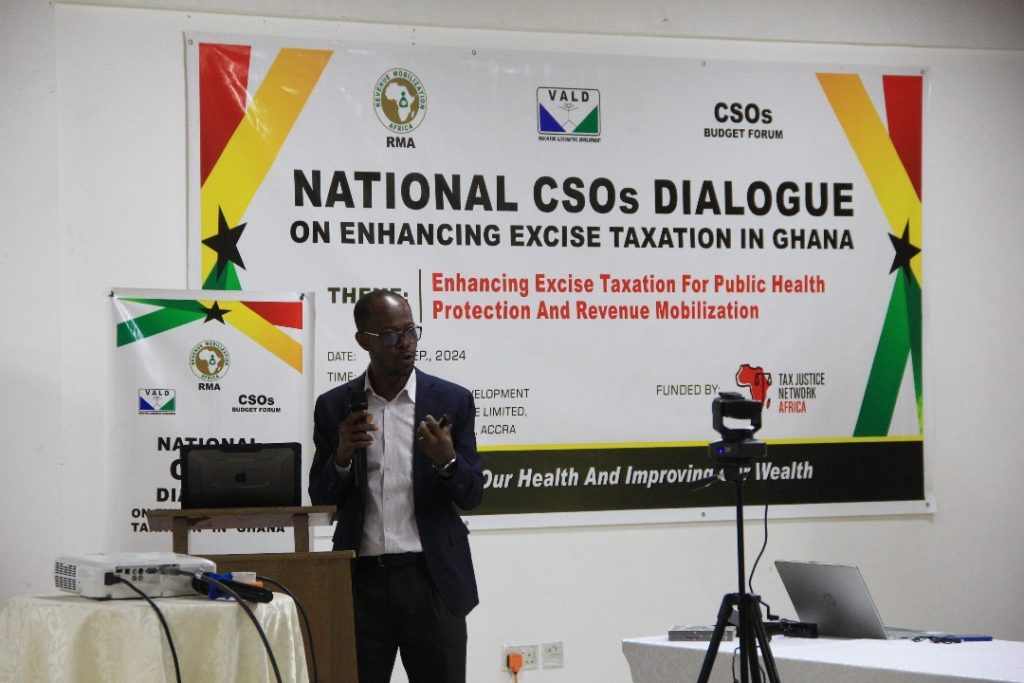By Albert Allotey
Accra, Sept 21, GNA – Participants at a day’s National CSOs Dialogue on Enhancing Excise Taxation in Ghana has called for an upward adjustment of the excise taxes on tobacco products, alcoholic and sugar-sweetened beverages to help prevent diseases and increase revenue generation.
The dialogue was on the theme: “Enhancing Excise Taxation for Public Health Protection and Revenue Mobilisation.”
It was aimed sensitising civil society organisation (CSO) advocates and experts on excise taxes and their positive impacts on the wealth and health of the nation; and to solicit and mobilize support from them to enhance and sustain the gains, especially the excise tax on health harming products.
It was also to explore existing opportunities/avenues for maximizing publicity and increased knowledge on excise taxes while helping to distinguished between the excise taxes and other taxes, which the harmful product industries have lumped all together to gain public support.
It was jointly organised by Revenue Mobilisation Africa, Vision for Alternative Development – Ghana (VALD), and CSOs Budget Forum with funding from Tax Justice Network Africa.
Mr. Richard Ameevor, a consultant in a presentation stated that excise duty (or excise tax) is tax imposed on the manufacturer, sale or consumption of some selected products as alcoholic beverages, tobacco products, sugar sweetened beverages, petroleum products, and luxury goods.

“It is also imposed on imported products to compensate for the internal levy on goods of like nature,” he said.
Mr. Ameevor pointed out that excise tax is a single stage tax, and it is paid once either by the manufacturer or importer when the goods are removed, loaded onto a conveyance at the factory gate in Ghana or at the point of entry.
“Unlike general sales taxes or VAT (Value Added Tax), which are broad-based and apply to most goods and services, excise taxes are indirect taxes targeted at particular products (often regarded as non-essential or harmful to health and the environment),” he said.
He stated that the purpose of excise taxation is for revenue generation and health promotion (and social policy), and that they are crucial to government to finance public services like healthcare, education among others.
“They are designed to discourage the consumption of harmful goods, thereby reducing the prevalence of health issues like smoking-related diseases, alcoholism, and obesity,” the consultant said.
He stated: “It works on the principle of price elasticity – as the price of a product increases, demand generally decreases. Also support social policy goals such reducing environmental pollution by taxing fuel among others.”
Mr. Ameevor said excise tax was aligned with global efforts to curb harmful consumption habits, and to also conform with ECOWAS protocols (application of both and ad Valorem and Specific duties on tobacco).
He said despite the challenges, excise taxation offers a viable path towards a healthier and economically stable Ghana and called for the strengthening of its enforcement laws.
“The taxes must be balanced to achieve the dual goals of revenue generation and public health promotion, and that the revenue should be used to fund public education on the harms of alcohol, tobacco, and sugar-sweetened beverage consumptions.”
Mr. Labram Musah, Executive Director of Programmes of VALD presented the overview of the Framework Convention on Tobacco Control (FCTC) and stressed Article six; “Price and Tax measures to reduce the demand for tobacco – (increase tax and price).
He said the article addresses the use of price and tax measures as effective tools for reducing tobacco consumption.
“These fiscal policies aim to discourage the uptake and continuation of tobacco use, particularly among vulnerable populations such as youth and low-income groups,” he stated, and that; “Higher tobacco taxes lead to increased prices, making tobacco products less affordable, thereby reducing demand.”
The article also emphasizes the importance of using revenues from tobacco taxes to fund health programmes and tobacco control initiatives.
Mr. Musah said: “Countries are encouraged to adopt evidence-based tax policies, ensure transparency in the use of revenues, and align these measures with their broader public health goals to achieve sustainable reductions in tobacco use.”
GNA